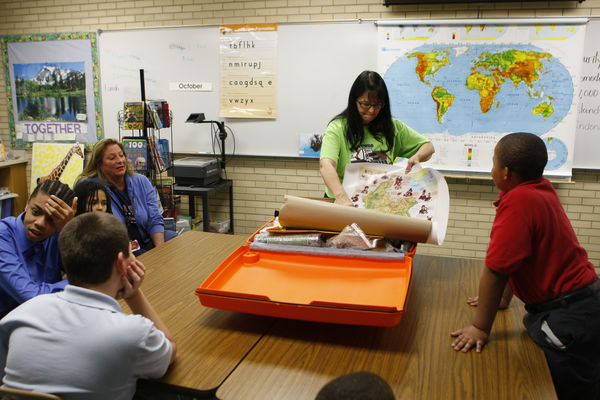Michiana students have been back in school for more than six weeks. Rhonda Neal, a seasoned resource teacher at South Bend Community School Corp.’s Edison Middle School, knows that the newness of the school year is fading. Neal says she wants to “mix it up a bit” for the students in her 12:15 p.m. social skills class of exceptional learners.
Neal heaves an orange Samsonite suitcase onto the desk in the front of the classroom. She invites her students to take guesses about what might be inside the large, mysterious case. “Is there something scary in there?” asks Neal.
“NOOOOOO!” yell the children with excitement.

Neal opens the treasure chest and begins to pull out masks, instruments, music CDs and other cultural artifacts from Indonesia as she asks questions of her students, who gasp each time a new item is drawn from the chest.
Savon, an enthusiastic middle-schooler, chooses a CD of Camobodian music he will play on one of the classroom computers. Another student, Belen, pops up from her chair to model a colorful hand-carved mask from Bali used for religious celebrations.
This “traveling trunk” is part of an outreach program offered to local teachers by The University of Notre Dame’s Kellogg Institute for International Studies. The Kellogg Traveling Trunks are key resources for Michiana educators in diverse settings that provide a variety of materials from regions of Africa, Latin America and Asia free of charge.
Ali Turnock, a social studies teacher at St. Anthony’s Catholic School, says she was looking for resources to engage her seventh-graders while learning about diverse cultures.
“The program makes it very easy for educators to integrate (the trunks) into their lesson plans,” says Turnock, whose eighth-grade students shared their research on instruments and other artifacts from one of the African traveling trunks. Two of Turnock’s female students described the craftsmanship of fertility dolls and shared their study of the cultural significance of this East African right of passage for girls their age.
By teaching through authentic objects from around the world, the teacher becomes “a role model for showing interest and sensitivity to other cultures,” says Spanish teacher Priscilla Dressen of School City of Mishawaka’s John Young Middle School. The middle school Spanish teacher has been using the trunks for years in her classroom.
“Celebrating different worldviews helps students overcome prejudice and promotes social justice and tolerance of diversity in schools,” Dressen explains.
Regardless of the educational setting, the authentic materials from the Kellogg Traveling Trunks invite local students to explore cultures and traditions from around the world. Other innovative K-12 Kellogg outreach initiatives include international teacher discussion groups and workshops, a video lending library, a student-written travel journal and a global speakers program. For more information, go to http://kellogg.nd.edu/outreach.
Photo caption: Rhonda Neal, teacher at Edison Intermediate Center, presents artifacts from a Kellogg Institute Traveling Trunk to her students. Photo courtesy of Santiago Flores, South Bend Tribune